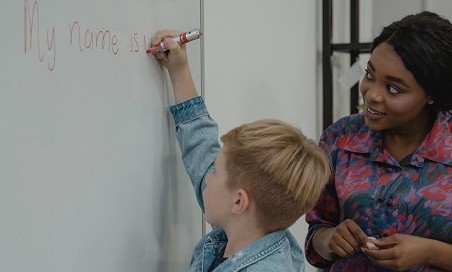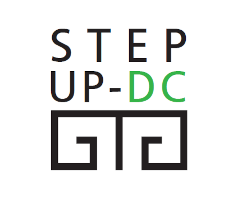Session 7C, ENGLISH LANGUAGE - 3 - Developing intercultural competence with Secondary School Learners of English
STEPUP-DC Project

Course DescriptionBasic Topics
- Understanding intercultural communicative competence in the secondary school context.
- Developing cross linguistic mediation skills, intercultural awareness, democratic values, and civic engagement.
- Designing lessons and activities premised on problem solving, collaboration and connected learning.
Duration
The duration of the session is 9 hours (3 reading + 3 learning + 3 working/practicing)
Objectives
The Objectives of this session are:
- Familiarise students with current debates in pupils’ participation in education (including classroom participation, participation in learning, and participation in school governance).
- Support students in developing a critical understanding of the concept of pupils’ voice, particularly examined in the context of formal education.
- Engage students in critical explorations of the role of teachers in democratic pedagogies, including the whole school approach.
Learning outcomes
On the completion of the session, students will be able to:
- Explain how teenage language learners learn second/foreign languages and what kind of learning activities are appropriate for this age group.
- Develop intercultural competence with teenage learners.
- Define cross cultural mediation skills and design learning activities that promote these skills.
- Design project-based lessons for the development of intercultural communicative competence and democratic values.
- Exploit connected learning and learning communities to encourage intercultural communication and civic engagement.
Outcomes and CDC
- Knowledge and critical understanding
- 117: Can explain the meaning of basic political concepts, including democracy, freedom, citizenship, rights and responsibilities (basic)
- 119: Can describe basic cultural practices (e.g. eating habits, greeting practices, ways of addressing people, politeness) in one other culture (basic)
- 120: Can reflect critically on how her/his own world view is just one of many world views (basic)
- 122: Can reflect critically on the risks associated with environmental issues (basic)
- 124: Can reflect critically on the relationship between human rights, democracy, peace and security in a globalised world (intermediate)
- Values
- Valuing cultural diversity
- 203: Argues that one should promote communication and dialogue between people from different cultural backgrounds (basic/intermediate)
- 205: Argues that one should try to learn from one another in order to deepen understanding of both one’s own and other people’s backgrounds (intermediate/advanced)
- 206: Argues that intercultural dialogue should be used to help us recognize our different identities and cultural affiliations (advanced)
- 207: Argues that intercultural dialogue should be used to develop respect and a culture of “living together” (advanced)
- Attitudes
- Open to Cultural Otherness
- 401: Shows interest in learning about people’s beliefs, values, traditions and world views (basic)
- 403: Uses opportunities to meet new people (basic/intermediate)
- 404: Expresses curiosity about other beliefs and interpretations and other cultural orientations and affiliations (intermediate)
- 405: Expresses an appreciation of the opportunity to have experiences of other cultures (intermediate)
- 407: Enjoys having discussions with people whose ideas and values are different from his/her own (intermediate/advanced)
- Respect
- 501: Gives space to others to express themselves (basic)
- 502: Expresses respect for other people as equal human beings (basic)
- 504: Treats all people with respect regardless of their cultural background (intermediate)
- Civic mindedness
- 601: Expresses a willingness to co-operate and work with others (basic)
- 602: Collaborates with other people for common interest causes (basic)
- 604: Expresses a willingness to participate in collective decision making (basic/intermediate)
- 607: Expresses an interest in public affairs and issues (intermediate)
- 611: Is actively involved in community issues (intermediate/advanced)
- Tolerance of ambiguity
- 901: Engages well with other people who have a variety of different points of view (basic)
- Skills
- Autonomous Learning Skills
- 1001: Shows ability to identify resources for learning (e.g. people, books, internet) (basic)
- 1003: Accomplishes learning tasks independently (basic)
- 1006: Can identify relevant sources of information to accomplish a learning task (basic/intermediate)
- 1007: Can gather information effectively using a variety of techniques and sources (basic/intermediate)
- 1008: Uses appropriate tools and information technologies effectively to discover new information (basic/intermediate)
- Understanding intercultural communicative competence in the secondary school context.
- Developing cross linguistic mediation skills, intercultural awareness, democratic values, and civic engagement.
- Designing lessons and activities premised on problem solving, collaboration and connected learning.
The duration of the session is 9 hours (3 reading + 3 learning + 3 working/practicing)
The Objectives of this session are:
- Familiarise students with current debates in pupils’ participation in education (including classroom participation, participation in learning, and participation in school governance).
- Support students in developing a critical understanding of the concept of pupils’ voice, particularly examined in the context of formal education.
- Engage students in critical explorations of the role of teachers in democratic pedagogies, including the whole school approach.
On the completion of the session, students will be able to:
- Explain how teenage language learners learn second/foreign languages and what kind of learning activities are appropriate for this age group.
- Develop intercultural competence with teenage learners.
- Define cross cultural mediation skills and design learning activities that promote these skills.
- Design project-based lessons for the development of intercultural communicative competence and democratic values.
- Exploit connected learning and learning communities to encourage intercultural communication and civic engagement.
- Knowledge and critical understanding
- 117: Can explain the meaning of basic political concepts, including democracy, freedom, citizenship, rights and responsibilities (basic)
- 119: Can describe basic cultural practices (e.g. eating habits, greeting practices, ways of addressing people, politeness) in one other culture (basic)
- 120: Can reflect critically on how her/his own world view is just one of many world views (basic)
- 122: Can reflect critically on the risks associated with environmental issues (basic)
- 124: Can reflect critically on the relationship between human rights, democracy, peace and security in a globalised world (intermediate)
- Values
- Valuing cultural diversity
- 203: Argues that one should promote communication and dialogue between people from different cultural backgrounds (basic/intermediate)
- 205: Argues that one should try to learn from one another in order to deepen understanding of both one’s own and other people’s backgrounds (intermediate/advanced)
- 206: Argues that intercultural dialogue should be used to help us recognize our different identities and cultural affiliations (advanced)
- 207: Argues that intercultural dialogue should be used to develop respect and a culture of “living together” (advanced)
- Valuing cultural diversity
- Attitudes
- Open to Cultural Otherness
- 401: Shows interest in learning about people’s beliefs, values, traditions and world views (basic)
- 403: Uses opportunities to meet new people (basic/intermediate)
- 404: Expresses curiosity about other beliefs and interpretations and other cultural orientations and affiliations (intermediate)
- 405: Expresses an appreciation of the opportunity to have experiences of other cultures (intermediate)
- 407: Enjoys having discussions with people whose ideas and values are different from his/her own (intermediate/advanced)
- Respect
- 501: Gives space to others to express themselves (basic)
- 502: Expresses respect for other people as equal human beings (basic)
- 504: Treats all people with respect regardless of their cultural background (intermediate)
- Civic mindedness
- 601: Expresses a willingness to co-operate and work with others (basic)
- 602: Collaborates with other people for common interest causes (basic)
- 604: Expresses a willingness to participate in collective decision making (basic/intermediate)
- 607: Expresses an interest in public affairs and issues (intermediate)
- 611: Is actively involved in community issues (intermediate/advanced)
- Tolerance of ambiguity
- 901: Engages well with other people who have a variety of different points of view (basic)
- Open to Cultural Otherness
- Skills
- Autonomous Learning Skills
- 1001: Shows ability to identify resources for learning (e.g. people, books, internet) (basic)
- 1003: Accomplishes learning tasks independently (basic)
- 1006: Can identify relevant sources of information to accomplish a learning task (basic/intermediate)
- 1007: Can gather information effectively using a variety of techniques and sources (basic/intermediate)
- 1008: Uses appropriate tools and information technologies effectively to discover new information (basic/intermediate)
- Autonomous Learning Skills
A series of resources that the student teacher must study in this session and a series of additional resources for further study.
A full paper and additional e-lessons on the topics of the session and additional interactive presentation of the materials, for the student teachers to study all the materials in a row.
A series of authentic, up to date and relevant activities with their accompanying materials, which deliver the intended learning outcomes of the session and are carried out face to face or E-learning with groups of student teachers.
Several types of questions to evaluate how much the student teachers have learned throughout the session (reading material, learning material and workshop).
